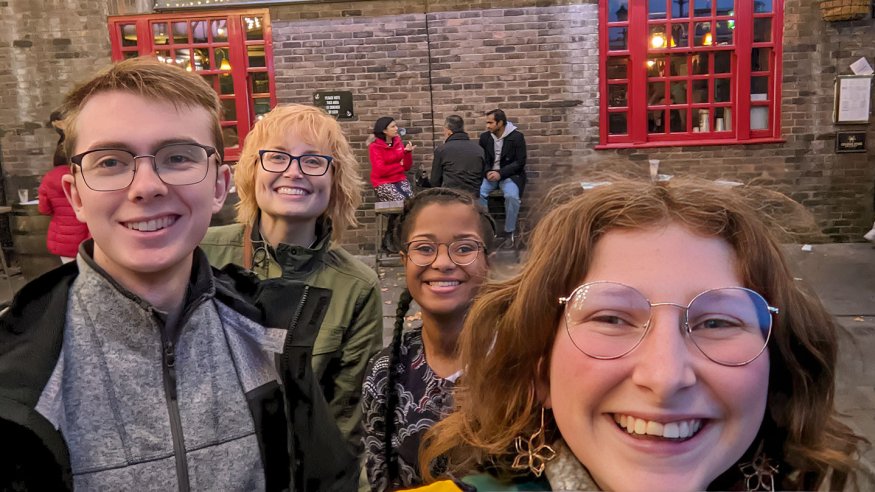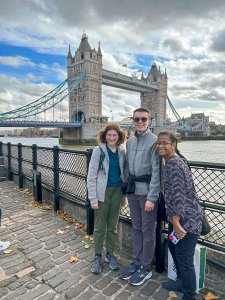
Exploring Allergens
Ohio Wesleyan Students Visit United Kingdom to Research Food Labeling Regulations
Three Ohio Wesleyan University students traveled to London with their professor over October’s mid-semester break to research and compare food allergen regulations in the United Kingdom and the United States.
Making the trip were Kolby Brock, a Politics and Government major with a minor in Accounting from San Dimas, California; Karli Walsh, a Philosophy and Politics and Government double major from Mason, Ohio; and Sarah Sewell-Conley, a Health and Human Kinetics major with a focus in nutrition from Toledo, Ohio. The travel-learning experience was led by Franchesca Nestor, Ph.D., assistant professor of Politics and Government, using an OWU Connection grant that grew out of her fall 2021 Food Politics and Policy class.

Important Distinctions
During the trip, the group visited supermarkets, farmers markets, and restaurants to differentiate food labels in the U.S. and the U.K. The group noticed important distinctions between the two, including that the labeling was much clearer in the U.K., often incorporating stickers or bold type.
“It was much easier to find allergens,” Brock said. “There’s not a standard in the U.S. Every product that we picked up mentioned how it was relevant for vegetarians or any other dietary restriction.
“In our Food Politics and Policy class with Dr. Nestor, one of the main focuses of the course was learning about food labeling through real-life field research,” Brock continued. “We visited a local grocery store to see if we could find food products to eat when given a set of hypothetical allergens. Some of the labels had lettering so small I could barely read them. Some of the wording was confusing. I learned how a person with severe dietary restrictions can become very anxious for their life and safety by shopping at the local market.”
Sewell-Conley added, “Foods in the U.S. are easily accessible, but in the U.K. there are more fresh products and cleaner options.”
Coloring Perceptions
They also compared popular sweets including Skittles and M&M’s. Bright food coloring has been claimed to cause hyperactivity, which is why, Walsh said, the U.K. version of the candies looks “toned down and dull” and “they taste more natural and earthy almost.”
Walsh summed up the group’s travel and research, stating, “It was a great experience in how course exploration is really applicable in the real world.”
Additional food research is expected with travel to other countries as part of the recurring Food Politics and Policy class.
Action and Practice
Brock said, “I am excited by the prospect of helping Dr. Nestor plan a future Travel-Learning Course. A trip would allow more students to see differences in food regulation in action and practice.”
Walsh added, “Awareness of the issues would also increase in the OWU community since we would present our findings to students and faculty, and work toward a new Travel-Learning Course.”
